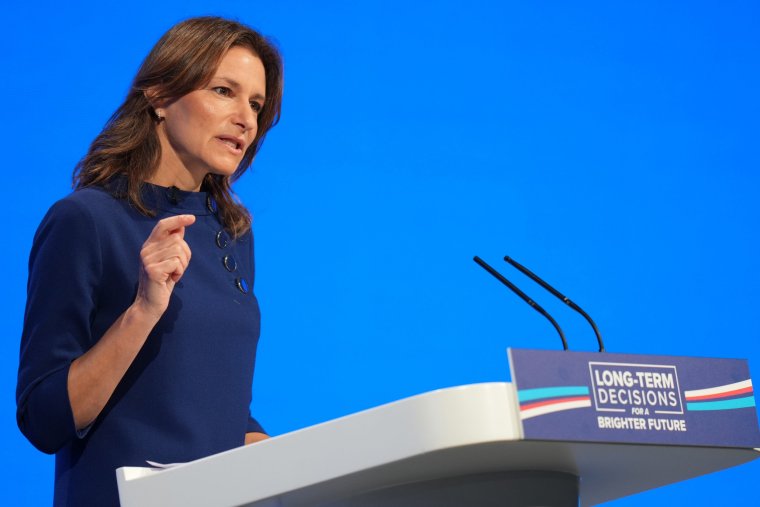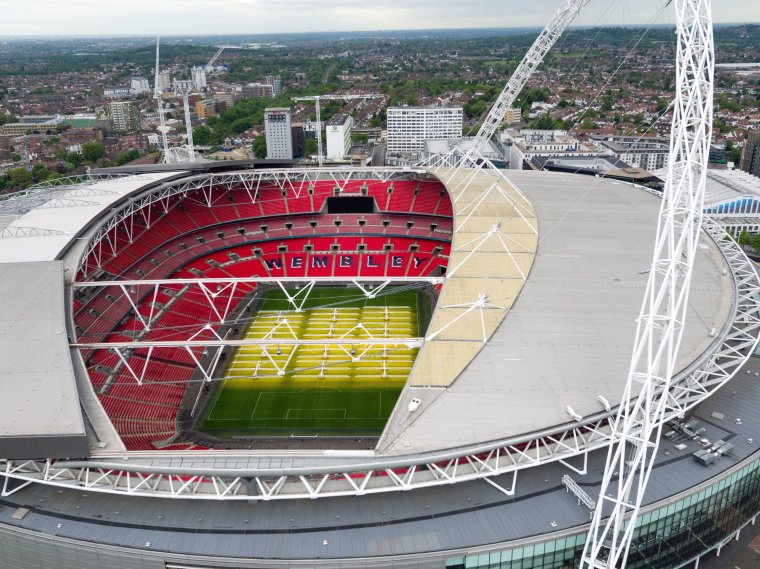The Culture Secretary has said she is “extremely disappointed” by the Football Association’s decision not to light up the Wembley arch with the colours of the Israeli flag following attacks by Hamas at the weekend.
The FA announced that black armbands will be worn and a period of silence observed at Friday’s friendly between England and Australia, despite facing pressure from politicians calling for the stadium’s landmark to be illuminated in solidarity with Israel.
On Thursday evening, Lucy Frazer, Secretary of State for Culture, Media and Sport, spoke out against the decision.
She posted on X (formerly Twitter): “I am extremely disappointed by the FA’s decision not to light up the Wembley Stadium arch following last weekend’s horrific terrorist attacks in Israel, and have made my views clear to the FA.
“It is especially disappointing in light of the FA’s bold stance on other terrorist attacks in the recent past. Words and actions matter. The Government is clear: we stand with Israel.”
What has the FA said?
The FA released a statement on Thursday confirming its plans for Friday’s fixture.
It read: “On Friday evening, we will remember the innocent victims of the devastating events in Israel and Palestine.
“Our thoughts are with them, and their families and friends in England and Australia and with all the communities who are affected by this ongoing conflict. We stand for humanity and an end to the death, violence, fear and suffering.
“England and Australia players will wear black armbands during their match at Wembley Stadium and there will also be a period of silence held before kick off.”

Only flags, kits and “other representations of nationality” relating to the competing countries will be allowed into the stadium for Friday’s match and England’s following Euro qualifier with Italy on Tuesday 17 October.
The FA said it will promote an emergency appeal launched by the British Red Cross within the stadium on Friday.
The Premier League has said players, managers and match officials will wear black armbands and observe a moment’s silence at the fixtures taking place over the weekend of October 21 to 23. The League will also make a donation to the British Red Cross to support the aid efforts helping those in urgent need.
EFL teams will pay their respect in the same way across its matches this weekend.
The Rugby Football League is discussing how best supporters and teams can most appropriately show respect to the conflict’s victims at Saturday’s Super League Grand Final.
Calls to light up Wembley arch in Israeli colours
Earlier this week, the Government wrote a letter to the UK’s government bodies in sport, encouraging them to “appropriately” mark the attacks in Israel with shows of support for the victims.
The letter, from Ms Frazer, read: “In the light of the attacks in Israel on behalf of the secretary of state we would encourage you to mark the events appropriately in line with previous events where sport has come together.”
Lord Mann, the Government’s antisemitism adviser, was also reported to be in talks with the FA about illuminating the Wembley arch for Friday’s match.
Speaking to the Jewish Chronicle, he said: “The Wembley Arch is highly visible across London and many Jewish communities will see it.
“What I’ve asked is for the arch to be lit up in the colours of the Jewish prayer shawl, blue and white.”

He added: “Football should have moved faster on this matter. It shows that football stands with the Jewish community.”
The move prompted a serious backlash from Tories, with MP for Bassetlaw Brendan Clarke-Smith describing it as a “shameful decision”.
The Health Secretary, Steve Barclay, said it would be “fitting” for the arch to be illuminated with Israeli colours, as Downing Street and the Palace of Westminster were earlier in the week.
Asked about the idea on Sky News on Thursday, he said: “I think we should make clear our strong support for Israel. We stand with Israel, and I think we’ve seen that with Parliament, we’ve seen it with Number 10. I think it would be fitting to show that with Wembley as well.”
On Wednesday, Labour Leader Keir Starmer called for the arch to be lit up for Friday’s game.
He told LBC radio: “I do think they should be on the arch because I think the message has to go out that we stand with Israel, the UK stands with Israel, and that is a manifestation of that support.”
What has the FA done in previous situations?
The Wembley arch has been lit up in the flags of another country in the wake of terrorist attacks and one invasion.
In 2015, the arch was lit in France’s red, white and blue as the two sides met for an international friendly just days after 130 people were killed in a series of terror attacks carried out by Isil in Paris.
In 2016, the arch bore the colours of the Belgian flag, one day after terror attacks carried out by Isis in Brussels killed 32 people and injured 300.
Later that year, the arch was was illuminated in the colours of the Turkish flag days after two bombings in Istanbul killed 48 people. The Kurdistan Freedom Hawks (TAK) claimed responsibility.
Last year, the arch was lit up in Ukrainian colours one day after Russia launched its invasion of the country.
The arch was also lit up in with rainbow colours during England’s World Cup meeting with USA in Qatar in December.
It came after England, along with six other nations, withdrew from plans for their captains to wear rainbow-coloured anti-discrimination “OneLove” armbands on the pitch in Qatar, where same-sex relationships are criminalised.
The FA is said to be hesitant about being seen to take sides in the conflict between Israel and Palestine, with the BBC reporting that it fears a “backlash from some communities.”
The Israeli government has responded to Saturday’s incursion with widespread missile strikes on Hamas-ruled Gaza, declaring a “total siege” of the densely populated costal strip, which has been cut off from electricity, fuel and water.
Israel’s death toll rose to 1,300 on Thursday, while 1,400 people have also been killed in Gaza from aerial strikes, according to officials on both sides.



Maurice Saatchi: I used to adore capitalism – then I had lunch with Margaret Thatcher